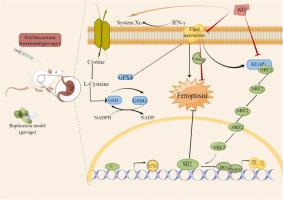Biomedicine & Pharmacotherapy ( IF 6.9 ) Pub Date : 2022-09-16 , DOI: 10.1016/j.biopha.2022.113631 Juan Chen 1 , Jiaxiang Zhang 1 , Ting Chen 1 , Shengchuan Bao 1 , Jingtao Li 2 , Hailiang Wei 3 , Xin Hu 4 , Yan Liang 4 , Fanrong Liu 5 , Shuguang Yan 1

|
Gastric mucosal injury is the initial stage of the occurrence and development of gastric diseases. Oxidative stress and ferroptosis caused by the imbalance of redox and iron dynamics in gastric mucosal epithelial cells are present throughout the occurrence and development of gastric mucosal injury. Therefore, the inhibition of oxidative stress and ferroptosis is a potential target for the treatment of the gastric mucosal injury. Xiaojianzhong decoction (XJZ), which consists of six Chinese herbal medicines and extracts, is used for the treatment of diseases related to gastrointestinal mucosal injury; however, its specific mechanism of action has yet to be clarified. In this study, we clarified the protective effect of XJZ on gastric mucosa and revealed its underlying mechanism. We established a gastric mucosal injury model using aspirin and administered XJZ. Furthermore, we systematically evaluated the mucosal injury and examined the expression of genes related to oxidative stress, ferroptosis, and inflammation. The study found that XJZ significantly counteracted aspirin-induced gastric mucosal injury and inhibited oxidative stress and ferroptosis in mice. Upon examining SQSTM1/p62(p62)/Kelch-like ECH-associated protein 1 (Keap1)/Nuclear Factor erythroid 2-Related Factor 2 (Nrf2), a well-known signaling pathway involved in the regulation of oxidative stress and ferroptosis, we found that its activation was significantly inhibited by aspirin treatment and that this signaling pathway was activated after XJZ intervention. Our study suggests that XJZ may inhibit aspirin induced oxidative stress and ferroptosis via the p62/Keap1/Nrf2 signaling pathway, thereby attenuating gastric mucosal injury.
中文翻译:

小建中汤通过激活p62/Keap1/Nrf2信号通路抑制铁死亡减轻胃黏膜损伤
胃黏膜损伤是胃病发生、发展的初始阶段。胃黏膜上皮细胞氧化还原和铁动力学失衡引起的氧化应激和铁死亡贯穿于胃黏膜损伤的发生和发展过程中。因此,抑制氧化应激和铁死亡是治疗胃黏膜损伤的潜在靶点。小建中汤(XJZ),由六种中草药和提取物组成,用于治疗与胃肠道粘膜损伤相关的疾病;但其具体作用机制尚待阐明。在这项研究中,我们阐明了XJZ对胃粘膜的保护作用并揭示了其潜在的机制。我们使用阿司匹林建立胃粘膜损伤模型并给予 XJZ。此外,我们系统地评估了粘膜损伤并检测了与氧化应激、铁死亡和炎症相关的基因表达。研究发现,XJZ 显着抵消了阿司匹林引起的胃粘膜损伤,并抑制了小鼠的氧化应激和铁死亡。通过检查 SQSTM1/p62(p62)/Kelch 样 ECH 相关蛋白 1 (Keap1)/核因子红细胞 2 相关因子 2 (Nrf2),这是一种众所周知的参与调节氧化应激和铁死亡的信号通路,我们发现其激活被阿司匹林治疗显着抑制,并且该信号通路在 XJZ 干预后被激活。











































 京公网安备 11010802027423号
京公网安备 11010802027423号